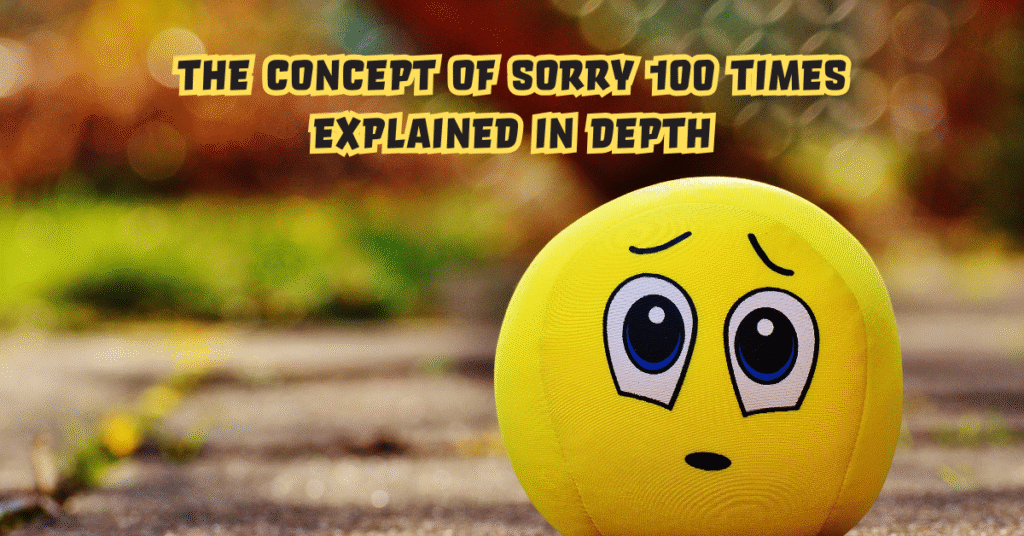The phrase “sorry 100 times” is more than an exaggerated apology—it represents persistence, guilt, reconciliation, and the weight of human emotion in relationships. People often say it in moments when a single “sorry” feels inadequate, when they seek to express remorse so strongly that repetition becomes the language of sincerity. Whether used in friendships, romantic relationships, workplaces, or cultural practices, saying sorry multiple times reflects both vulnerability and desperation. Within the first 100 words, it’s clear: “sorry 100 times” is not merely about apologizing, it’s about emphasizing one’s regret in an intensified manner that seeks forgiveness.
This guide explores the concept from psychological, cultural, and social perspectives. It asks: Why do people feel the need to repeat apologies? Does repetition make apologies more effective, or does it dilute sincerity? How does digital culture amplify the practice, especially when typed in messages, emails, or even memes? To answer these, we examine its emotional context, symbolic meaning, and impact on communication today.
The Meaning Behind Saying Sorry 100 Times
Saying sorry once acknowledges fault, but repeating it a hundred times magnifies emotional depth. It can symbolize regret so profound that ordinary words cannot capture it. Psychologists often argue that repetition in communication functions as a form of emphasis—akin to underlining a sentence or raising one’s voice. Thus, “sorry 100 times” is not a literal count but a figurative attempt to show persistence and sincerity.
In personal relationships, this repetition often comes after significant hurt. Partners or friends might say it repeatedly when they feel that one apology will not be enough. In professional settings, however, over-apologizing can weaken credibility, signaling insecurity rather than accountability. The balance between sincerity and excess becomes crucial, and this is why the phrase invites deeper study.
The Psychology of Repetition in Apologies
Repetition is tied closely to human psychology. Cognitive scientists suggest that repeated words tend to lodge themselves in memory. Saying sorry multiple times embeds the message deeper in the listener’s mind. In moments of guilt, repetition can also reduce internal emotional distress, as the speaker feels they are doing “enough” to repair the damage.
Yet, over-apologizing may also backfire. Research shows that when apologies become excessive, they risk sounding performative. A listener may begin to perceive them as lacking depth, like scripted lines rather than heartfelt expressions. Therefore, while “sorry 100 times” can convey passion, it must be balanced with action. As one famous phrase puts it: “Apologies are empty without change.”
Cultural Interpretations of Sorry 100 Times
Cultures across the world interpret repetition differently. In Japan, for instance, formal bows and repeated apologies signify respect and responsibility, while in Western societies, repeated apologies may sometimes be interpreted as weakness. In South Asian traditions, particularly in India and Pakistan, saying sorry many times can be an act of humility—a way to lower oneself before another in order to preserve relationships.
Digital culture has also expanded its reach. On messaging platforms, emojis, GIFs, and repeated text such as “sorry sorry sorry sorry…” reflect both playfulness and desperation. In memes, “sorry 100 times” has become shorthand for exaggerated regret, sometimes ironically applied to humorous mistakes. Thus, its meaning evolves depending on cultural and technological context.
Everyday Situations Where Sorry 100 Times Appears
Apologies take different shapes depending on the situation. Here are common contexts where the phrase is often used:
1. Romantic Relationships – When partners fight, one may say sorry repeatedly, hoping to rebuild trust.
2. Friendships – After hurting a friend unintentionally, repetition emphasizes that the bond is valued.
3. Workplace – Over-apologizing occurs when professionals feel pressure to admit small mistakes.
4. Digital Messaging – Text messages amplify repetition easily, with “sorryyyyy” or multiple “sorries” flooding the screen.
5. Family Dynamics – Children often say sorry multiple times to parents, reflecting both fear and affection.
Table 1: Situations and Interpretations of Saying Sorry 100 Times
| Situation | Purpose of Repetition | Impact on Listener |
|---|---|---|
| Romantic relationships | Rebuilding trust after conflict | Signals sincerity but can seem desperate |
| Friendships | Showing value of emotional bond | Often seen as heartfelt |
| Workplace | Managing accountability | May undermine confidence if excessive |
| Digital messaging | Expressing regret quickly | Playful, dramatic, or desperate |
| Family interactions | Balancing guilt with affection | Often leads to forgiveness |
Digital Age and the Meme Culture of Sorry 100 Times
In today’s digital landscape, “sorry 100 times” is no longer limited to spoken words. Online culture has amplified its use through memes, GIFs, and trends. People exaggerate apologies humorously to avoid tension in conversations, posting memes such as “Me saying sorry 100 times for eating your fries.” In social media communities, repetition has transformed into a playful yet effective form of communication.
Moreover, autocorrect and copy-paste features make it easier to send endless “sorry” messages in seconds. For younger generations, the act of repeating sorry digitally carries less emotional weight but more symbolic value. It’s not always about genuine regret—it’s about showing acknowledgment in a quick, relatable manner.
The Limits of Saying Sorry 100 Times
While repetition conveys intensity, it also has limitations. Forgiveness often depends more on actions than words. If someone apologizes repeatedly but fails to change behavior, the apologies lose meaning. This creates what psychologists call “apology fatigue,” where the listener tunes out repeated words.
Effective apologies require three components: acknowledgment of wrongdoing, expression of remorse, and a promise of corrective action. Without these, “sorry 100 times” becomes an empty phrase. As philosopher Hannah Arendt once said, “Forgiveness is the key to action and freedom, not the endless repetition of regret.”
Table 2: Effective vs. Ineffective Apologies
| Apology Type | Characteristics | Result |
|---|---|---|
| Effective apology | Acknowledges fault, shows remorse, offers solution | Builds trust and restores relationships |
| Ineffective apology | Repeats “sorry” without change | Creates frustration and weakens credibility |
| Exaggerated apology | Uses dramatic repetition (sorry 100 times) | Seen as emotional but may lack substance |
| Balanced apology | Combines sincerity with clear corrective action | Long-term positive impact |
Emotional Healing and the Role of Forgiveness
Apologies, even when repeated, are incomplete without forgiveness. Saying sorry 100 times might open the door, but healing requires the listener to accept and release resentment. Forgiveness does not always mean forgetting—it means choosing peace over anger. In this sense, the repeated apology becomes symbolic: it reflects the speaker’s yearning to heal, but the final step lies with the one receiving the apology
Philosophical Dimensions of Saying Sorry
Philosophers often argue that apologies are not merely social gestures but moral acts. When someone says sorry repeatedly, they engage in an ethical process of self-reflection. The repetition can serve as a ritual, almost like a chant, where each “sorry” is a step toward humility. This aligns with the idea that guilt is not only emotional but also moral. Thus, “sorry 100 times” becomes both a performance of guilt and an invitation for grace.
Practical Ways to Say Sorry Meaningfully
- Write a personal note – Instead of repeating sorry verbally, write a heartfelt message explaining your feelings.
- Offer corrective action – Show that the mistake will not be repeated by making a change.
- Use humor carefully – Light jokes can soften tension but should not dismiss the seriousness of the mistake.
- Give time and space – Sometimes silence and changed behavior are stronger than repeated words.
- Symbolic gestures – Acts of kindness, like preparing a meal or small gifts, can supplement verbal apologies.
Conclusion
“Sorry 100 times” represents more than words—it is a symbol of how deeply humans wish to mend broken bonds. From psychology to culture, from digital memes to family traditions, its meaning changes depending on context. Repetition magnifies emotions but cannot replace accountability. To be effective, an apology must go beyond the words themselves, supported by genuine actions and a commitment to change. As one wise saying reminds us, “One sincere sorry is worth more than a hundred empty ones.”
The practice of saying sorry repeatedly will continue to evolve, shaped by culture, technology, and human relationships. What remains timeless, however, is the universal need for forgiveness, healing, and the courage to admit when we are wrong.
FAQs
Q1. What does “sorry 100 times” mean in communication?
It symbolizes exaggerated regret, where repetition emphasizes emotional intensity, often used in relationships, friendships, or digital messaging.
Q2. Does saying sorry multiple times make an apology more effective?
It can show sincerity but may also lose impact if not supported by meaningful actions or behavioral change.
Q3. Why do people over-apologize?
Over-apologizing is linked to guilt, insecurity, or cultural habits. It can also be a way of reducing internal distress.
Q4. Is saying sorry 100 times common in digital culture?
Yes, repetition is widespread in texts, memes, and social media, often used playfully or dramatically to show regret.
Q5. What makes an apology truly effective?
An effective apology includes acknowledgment of fault, genuine remorse, and a clear commitment to corrective action.







